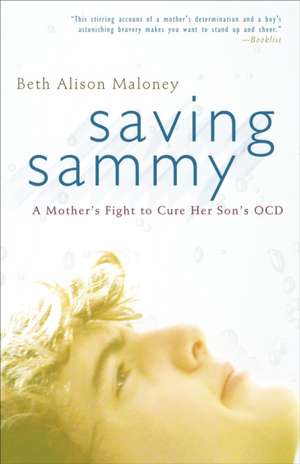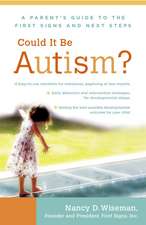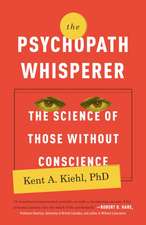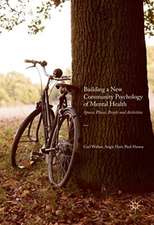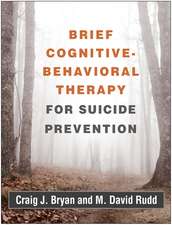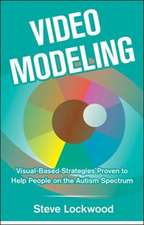Saving Sammy: A Mother's Fight to Cure Her Son's Ocd
Autor Beth Alison Maloneyen Limba Engleză Paperback – 30 sep 2010
Vezi toate premiile Carte premiată
Books for a Better Life (2009)
The summer before entering sixth grade, Sammy, a bright and charming boy who lived on the coast of Maine, suddenly began to exhibit disturbing behavior. He walked and ate with his eyes shut, refused to bathe, burst into fits of rage, slithered against walls, and used his limbs instead of his hands to touch light switches, doorknobs, and faucets.
Sammy’s mother, Beth, already coping with the overwhelming responsibility of raising three sons alone, watched helplessly as her middle child descended into madness. Sammy was soon diagnosed with obsessive-compulsive disorder (OCD) and later with Tourette syndrome. Unwilling to accept the doctors’ prognoses for lifelong mental illness and repeated hospitalizations, Beth fought to uncover what was causing this decline. Beth’s quest took her to the center of the medical community’s raging debate about whether OCD and Tourette syndrome can be caused by PANDAS (Pediatric Autoimmune Neuropsychiatric Disorders Associated with Streptococcal Infections). With the battle lines firmly drawn, Beth searched until she found two cutting-edge doctors who answered that question with a definitive yes. Together, they cured Sammy. Five years later, he remains symptom free.
Preț: 110.69 lei
Nou
Puncte Express: 166
Preț estimativ în valută:
21.19€ • 23.02$ • 17.81£
21.19€ • 23.02$ • 17.81£
Carte disponibilă
Livrare economică 01-15 aprilie
Preluare comenzi: 021 569.72.76
Specificații
ISBN-13: 9780307461841
ISBN-10: 030746184X
Pagini: 272
Dimensiuni: 140 x 203 x 15 mm
Greutate: 0.21 kg
Editura: BROADWAY BOOKS
ISBN-10: 030746184X
Pagini: 272
Dimensiuni: 140 x 203 x 15 mm
Greutate: 0.21 kg
Editura: BROADWAY BOOKS
Recenzii
From Publishers Weekly (Starred)
Maloney's debut chronicles her son, Sammy, and the illness that, almost overnight, transformed him from a sunny, bright boy (described by one teacher as "the purest math mind the school had ever seen") into an antisocial stranger "so dominated by obsessions, compulsions, and rules that daily life becomes impossible." Sammy's descent into mental illness was diagnosed as severe Obsessive-Compulsive Disorder, Tourette's and a number of other ailments, all promising a lifetime of disability; it wasn't until a family acquaintance, whose son exhibited the same symptoms for 10 years, urged Maloney to have Sammy tested for Strep that they learned his condition was treatable. Describing herself as "part courtroom lawyer and part detective," attorney Maloney perseveres with ferocity and sharp storytelling instincts, making this medical mystery—meant to inform families dealing with mental illness—a tear-wrenching crowd-pleaser.
From Booklist
At 12, Maloney's son Sammy won math awards but exhibited bizarre symptoms. The newly divorced mother's concerns grew as Sammy started hopping and spinning instead of walking and repeatedly resorted to uncontrollable headbanging. His disintegration, diagnosed without any thought about causation as sudden onset obsessive-compulsive disorder, included verbal tics, hours-long crying jags, and sporadic refusals to eat. Linking infection to "mental" illness, as strep antibodies are linked to the neurological Tourette's syndrome, has been rejected by many doctors since the rise of psychoanalysis, but Maloney insisted Sammy be tested for strep titers when he became unable to attend school and to walk. He was diagnosed with pediatric neuropsychiatric disorders associated with streptococcal infections, caused by strep antibodes attacking the basal ganglia controlling behavior. Antibiotics ended two torturous years for the family, and Sammy's regains came as rapidly as the symptoms had overtaken him. This stirring account of a mother's determination and a boy's astonishing bravery makes you want to stand up and cheer. ߝWhitney Scott
++++++
"SAVING SAMMY is a remarkable journey of a mother's perseverance to save her son. Her discoveries may well hold the key to curing the lives of millions of others."
Daniel A. Geller, M.D. - Director Pediatric Obsessive Compulsive Disorder Program, Massachusetts General Hospital; Associate Professor of Psychiatry, Harvard Medical School
"Of all the children I've treated, Sammy is the one at both ends of the spectrum. I'd never seen one so sick or one who came so far. I think the difference was his mother. Her willingness to be aggressive and fight for her son may help in healing others."
Catherine D. Nicolaides, M.D. - Developmental Pediatrics - Marlton, New Jersey
“As a physician, SAVING SAMMY reminds me that we, as a profession, are prone to hubris. My heart aches for Beth and her family every time I think of the dozens of doctors who scoffed and dismissed the incredibly valuable information she provided them. Consideration should be given for making this book mandatory reading at all U.S. medical schools. As a parent, I am inspired because we all will have our battles and issues. Few will be of this magnitude, but whether my child has problems at school, the Y, summer camp or whatever, this story reminds me that there is no effort too great to expend on the beautiful creatures that are our children.”
Kevin Price, M.D.
General Surgeon, Southern Maine Medical Center
Biddeford, Maine
“With SAVING SAMMY, Beth Maloney is the first to document the harrowing journey as a mother of a son with strep-triggered OCD— known as PANDAS. This compelling story is written in such a clear and engaging manner that the reader is hard pressed to put it down. Ms. Maloney’s poignant description of both the ravages of the illness itself and the hurdles to find treatment not only sheds light on the dark corners of this disorder, but captures the universal anguish of any parent watching their child slip away and at the same time being determined to hold on with all their might. In this gripping memoir, we see living proof of the much contested connection between strep and OCD. We also experience the agony of a parent who knows that solutions are out there, but can only be accessed by overcoming the obstacles and biases within the medical community. By sharing her family's ordeal and ultimate triumph, Ms. Maloney urges us all to make a pivotal shift in how we look at mental illness and its cure. The quality of life for thousands, if not millions, of families depends on our doing so.
Tamar Chansky, Ph.D. - Author: Freeing Your Child from Obsessive Compulsive Disorder, Freeing Your Child from Anxiety and Freeing Your Child from Negative Thinking
Director, Children's Center for OCD and Anxiety, Plymouth Meeting PA
“There isn't a parent who would not want to have this information. The implications of this riveting story reach far beyond children who are afflicted with obsessive-compulsive disorder."
Christopher P. Leddy - Assistant Attorney General, State of Maine
“I might not have believed Sammy’s stunning transformation if I had not seen it for myself. I watched a gifted young mathematician robbed of his life, lose all control and hope, and then regain his former self. Beth Maloney’s relentless battle and ultimate success in reclaiming her son captures the heart of anyone who has ever loved a child. Her victory sheds new light on ways of treating mental illness and inspires us all to greater good.”
Fern Brown, M.S.Ed, CAS
Gifted and Talented Coordinator - Co-Director, Maine Odyssey of the Mind
From the Hardcover edition.
Maloney's debut chronicles her son, Sammy, and the illness that, almost overnight, transformed him from a sunny, bright boy (described by one teacher as "the purest math mind the school had ever seen") into an antisocial stranger "so dominated by obsessions, compulsions, and rules that daily life becomes impossible." Sammy's descent into mental illness was diagnosed as severe Obsessive-Compulsive Disorder, Tourette's and a number of other ailments, all promising a lifetime of disability; it wasn't until a family acquaintance, whose son exhibited the same symptoms for 10 years, urged Maloney to have Sammy tested for Strep that they learned his condition was treatable. Describing herself as "part courtroom lawyer and part detective," attorney Maloney perseveres with ferocity and sharp storytelling instincts, making this medical mystery—meant to inform families dealing with mental illness—a tear-wrenching crowd-pleaser.
From Booklist
At 12, Maloney's son Sammy won math awards but exhibited bizarre symptoms. The newly divorced mother's concerns grew as Sammy started hopping and spinning instead of walking and repeatedly resorted to uncontrollable headbanging. His disintegration, diagnosed without any thought about causation as sudden onset obsessive-compulsive disorder, included verbal tics, hours-long crying jags, and sporadic refusals to eat. Linking infection to "mental" illness, as strep antibodies are linked to the neurological Tourette's syndrome, has been rejected by many doctors since the rise of psychoanalysis, but Maloney insisted Sammy be tested for strep titers when he became unable to attend school and to walk. He was diagnosed with pediatric neuropsychiatric disorders associated with streptococcal infections, caused by strep antibodes attacking the basal ganglia controlling behavior. Antibiotics ended two torturous years for the family, and Sammy's regains came as rapidly as the symptoms had overtaken him. This stirring account of a mother's determination and a boy's astonishing bravery makes you want to stand up and cheer. ߝWhitney Scott
++++++
"SAVING SAMMY is a remarkable journey of a mother's perseverance to save her son. Her discoveries may well hold the key to curing the lives of millions of others."
Daniel A. Geller, M.D. - Director Pediatric Obsessive Compulsive Disorder Program, Massachusetts General Hospital; Associate Professor of Psychiatry, Harvard Medical School
"Of all the children I've treated, Sammy is the one at both ends of the spectrum. I'd never seen one so sick or one who came so far. I think the difference was his mother. Her willingness to be aggressive and fight for her son may help in healing others."
Catherine D. Nicolaides, M.D. - Developmental Pediatrics - Marlton, New Jersey
“As a physician, SAVING SAMMY reminds me that we, as a profession, are prone to hubris. My heart aches for Beth and her family every time I think of the dozens of doctors who scoffed and dismissed the incredibly valuable information she provided them. Consideration should be given for making this book mandatory reading at all U.S. medical schools. As a parent, I am inspired because we all will have our battles and issues. Few will be of this magnitude, but whether my child has problems at school, the Y, summer camp or whatever, this story reminds me that there is no effort too great to expend on the beautiful creatures that are our children.”
Kevin Price, M.D.
General Surgeon, Southern Maine Medical Center
Biddeford, Maine
“With SAVING SAMMY, Beth Maloney is the first to document the harrowing journey as a mother of a son with strep-triggered OCD— known as PANDAS. This compelling story is written in such a clear and engaging manner that the reader is hard pressed to put it down. Ms. Maloney’s poignant description of both the ravages of the illness itself and the hurdles to find treatment not only sheds light on the dark corners of this disorder, but captures the universal anguish of any parent watching their child slip away and at the same time being determined to hold on with all their might. In this gripping memoir, we see living proof of the much contested connection between strep and OCD. We also experience the agony of a parent who knows that solutions are out there, but can only be accessed by overcoming the obstacles and biases within the medical community. By sharing her family's ordeal and ultimate triumph, Ms. Maloney urges us all to make a pivotal shift in how we look at mental illness and its cure. The quality of life for thousands, if not millions, of families depends on our doing so.
Tamar Chansky, Ph.D. - Author: Freeing Your Child from Obsessive Compulsive Disorder, Freeing Your Child from Anxiety and Freeing Your Child from Negative Thinking
Director, Children's Center for OCD and Anxiety, Plymouth Meeting PA
“There isn't a parent who would not want to have this information. The implications of this riveting story reach far beyond children who are afflicted with obsessive-compulsive disorder."
Christopher P. Leddy - Assistant Attorney General, State of Maine
“I might not have believed Sammy’s stunning transformation if I had not seen it for myself. I watched a gifted young mathematician robbed of his life, lose all control and hope, and then regain his former self. Beth Maloney’s relentless battle and ultimate success in reclaiming her son captures the heart of anyone who has ever loved a child. Her victory sheds new light on ways of treating mental illness and inspires us all to greater good.”
Fern Brown, M.S.Ed, CAS
Gifted and Talented Coordinator - Co-Director, Maine Odyssey of the Mind
From the Hardcover edition.
Notă biografică
BETH ALISON MALONEY is a successful Maine attorney and guardian ad litem. Before moving to Maine, she was an executive and attorney in the motion picture and television business in Los Angeles. Saving Sammy is her first book.
From the Hardcover edition.
From the Hardcover edition.
Extras
Daniel A. Geller, M.D.
Director, Pediatric OCD Program
Massachusetts General Hospital
Child and Adolescent Psychiatry, Yawkey 6A
55 Fruit Street
Boston, MA 02114
Dear Dr. Geller:
Enclosed please find the completed registration forms for
my son Sammy. As you know, we are coming to see you next
week on the advice of Dr. Catherine Nicolaides of Marlton,
New Jersey.
I thought it would be helpful to provide you with this
overview of Sammy's history and current behaviors. The
problems suddenly started sixteen months ago, shortly after he
turned twelve. Among other things, he stopped eating and lost
twenty pounds.
Sammy does not seem to have obsessions, but he certainly
has compulsions. His compulsions fall into two categories: rituals
and avoidance.
He likes to start the morning with something he calls "the
usual." When he asks for the usual, that means he wants five
drinks: milk, orange juice, apple juice, pink lemonade, and
grape juice. He pinches his nose when he sips and drinks
them in a certain order. The drinks do not all have to be at the
same level in the cups. They do not have to be in any particular
cups. He just needs all five juices, every morning.
He has to go through a series of complicated motions before
he'll go into the bathroom, before he comes back into the house
from being outside, when he first gets into the house, or when
he walks through a parking lot—in short, everywhere he goes.
This might involve swirling his legs, ducking, crawling, rolling
his head on his neck, stepping sideways, or high-stepping over a
nonexistent barrier. At our home, he has to do these in the exact
same spot each time. The ritual itself might be different, but the
spot does not vary. It is a major effort for him to walk upstairs in
the house. He has to hold his breath while he runs up the stairs,
stopping midway on the landing to duck his head into a cabinet
and gasp for air. When he needs to do a whole series of compulsive
behaviors, we have to leave the room. I don't know if this is
so that we don't see him or so he can give the routine his full
attention—and thus do it exactly right.
There are many things he avoids, including all mats, doors,
and faucets. He does not shower or brush his teeth except at
the hotel where we stay in New Jersey (when we go to see Dr.
Nicolaides). Even then, he does not use soap. He told me that
he is going to try to take showers at home, at noon, on Saturdays,
beginning this weekend.
He is very careful about what he touches and what
touches him. Hugs are out of the question. He does not flush
the toilet. He does not wash his hands. He does not touch
light switches. He does not touch his food. He uses either
utensils (only those with a silver handle) or a paper towel or
napkin to hold, for example, a slice of toast. He will not open
a door (house or car). He will not step on a rug. He avoids or
jumps over the white stripes in a parking lot.
He has started answering the telephone, using a tissue to
grasp the receiver, but he holds it away from his ear and shouts.
At the computer, he previously covered the mouse with a napkin,
but lately he touches it directly. He prefers to run outside
to urinate, rather than enter the bathroom (about which he
thinks I don't know). But because he cannot touch a door
handle, he must find someone to open the outside door. If he
can't find someone, he will use the bathroom because I make
certain the door is always left ajar.
He will not wear a coat or jacket. If it's raining, he gets
wet. If it's freezing, he gets cold.
Last year he would not wear socks or shoes. Now he wears
socks all the time, wears shoes whenever he goes outside, and
cringes if anyone is in bare feet. Consequently, we must all
wear socks at all times. Even sandals are a problem. The issue is
primarily bare toes, but heels are also troublesome.
He only likes to wear certain colors—preferably khaki and
green. For a while he wore the same clothes for months, but
thankfully he now changes them at least once a week.
He would never hurt himself or anyone else.
If he thinks he is being too demanding, he gets teary-eyed.
He used to ask me to do certain rituals (such as carry his
food a certain way), but I wasn't especially cooperative. He no
longer asks.
I'm tired just from typing all this loopy stuff, so it must be
a full day's work for him to keep it straight.
He is not able to attend school. A tutor comes to the house.
He stands and moves in the shape of an upside-down L.
Prior to the onset sixteen months ago, Sammy did not exhibit
any of the behaviors outlined above, with one exception.
Four years ago, in the winter of third grade, he started having
a tough time. He would curl the fingers of his left hand up and
into his sleeve. We eventually figured out that he had a learning
disability in reading. With a special reading program in place to
address this challenge, the hand gradually dropped down and
out of the sleeve.
I have enclosed a chart tracking Sammy's medication history.
Thank you very much, and we look forward to meeting
you.
Odds are he'll be the one wearing the khaki pants and
green shirt.
Beth Maloney
Kennebunkport, Maine
cc: Dr. Catherine Nicolaides
Dr. Conner Moore
From the Hardcover edition.
Director, Pediatric OCD Program
Massachusetts General Hospital
Child and Adolescent Psychiatry, Yawkey 6A
55 Fruit Street
Boston, MA 02114
Dear Dr. Geller:
Enclosed please find the completed registration forms for
my son Sammy. As you know, we are coming to see you next
week on the advice of Dr. Catherine Nicolaides of Marlton,
New Jersey.
I thought it would be helpful to provide you with this
overview of Sammy's history and current behaviors. The
problems suddenly started sixteen months ago, shortly after he
turned twelve. Among other things, he stopped eating and lost
twenty pounds.
Sammy does not seem to have obsessions, but he certainly
has compulsions. His compulsions fall into two categories: rituals
and avoidance.
He likes to start the morning with something he calls "the
usual." When he asks for the usual, that means he wants five
drinks: milk, orange juice, apple juice, pink lemonade, and
grape juice. He pinches his nose when he sips and drinks
them in a certain order. The drinks do not all have to be at the
same level in the cups. They do not have to be in any particular
cups. He just needs all five juices, every morning.
He has to go through a series of complicated motions before
he'll go into the bathroom, before he comes back into the house
from being outside, when he first gets into the house, or when
he walks through a parking lot—in short, everywhere he goes.
This might involve swirling his legs, ducking, crawling, rolling
his head on his neck, stepping sideways, or high-stepping over a
nonexistent barrier. At our home, he has to do these in the exact
same spot each time. The ritual itself might be different, but the
spot does not vary. It is a major effort for him to walk upstairs in
the house. He has to hold his breath while he runs up the stairs,
stopping midway on the landing to duck his head into a cabinet
and gasp for air. When he needs to do a whole series of compulsive
behaviors, we have to leave the room. I don't know if this is
so that we don't see him or so he can give the routine his full
attention—and thus do it exactly right.
There are many things he avoids, including all mats, doors,
and faucets. He does not shower or brush his teeth except at
the hotel where we stay in New Jersey (when we go to see Dr.
Nicolaides). Even then, he does not use soap. He told me that
he is going to try to take showers at home, at noon, on Saturdays,
beginning this weekend.
He is very careful about what he touches and what
touches him. Hugs are out of the question. He does not flush
the toilet. He does not wash his hands. He does not touch
light switches. He does not touch his food. He uses either
utensils (only those with a silver handle) or a paper towel or
napkin to hold, for example, a slice of toast. He will not open
a door (house or car). He will not step on a rug. He avoids or
jumps over the white stripes in a parking lot.
He has started answering the telephone, using a tissue to
grasp the receiver, but he holds it away from his ear and shouts.
At the computer, he previously covered the mouse with a napkin,
but lately he touches it directly. He prefers to run outside
to urinate, rather than enter the bathroom (about which he
thinks I don't know). But because he cannot touch a door
handle, he must find someone to open the outside door. If he
can't find someone, he will use the bathroom because I make
certain the door is always left ajar.
He will not wear a coat or jacket. If it's raining, he gets
wet. If it's freezing, he gets cold.
Last year he would not wear socks or shoes. Now he wears
socks all the time, wears shoes whenever he goes outside, and
cringes if anyone is in bare feet. Consequently, we must all
wear socks at all times. Even sandals are a problem. The issue is
primarily bare toes, but heels are also troublesome.
He only likes to wear certain colors—preferably khaki and
green. For a while he wore the same clothes for months, but
thankfully he now changes them at least once a week.
He would never hurt himself or anyone else.
If he thinks he is being too demanding, he gets teary-eyed.
He used to ask me to do certain rituals (such as carry his
food a certain way), but I wasn't especially cooperative. He no
longer asks.
I'm tired just from typing all this loopy stuff, so it must be
a full day's work for him to keep it straight.
He is not able to attend school. A tutor comes to the house.
He stands and moves in the shape of an upside-down L.
Prior to the onset sixteen months ago, Sammy did not exhibit
any of the behaviors outlined above, with one exception.
Four years ago, in the winter of third grade, he started having
a tough time. He would curl the fingers of his left hand up and
into his sleeve. We eventually figured out that he had a learning
disability in reading. With a special reading program in place to
address this challenge, the hand gradually dropped down and
out of the sleeve.
I have enclosed a chart tracking Sammy's medication history.
Thank you very much, and we look forward to meeting
you.
Odds are he'll be the one wearing the khaki pants and
green shirt.
Beth Maloney
Kennebunkport, Maine
cc: Dr. Catherine Nicolaides
Dr. Conner Moore
From the Hardcover edition.
Premii
- Books for a Better Life Finalist, 2009
